BMIH4006: International Hotel Management Student Learning Log
VerifiedAdded on 2023/06/16
|35
|11884
|397
Journal and Reflective Writing
AI Summary
This student journal, a learning log for the Operating Hotel Facilities module (BMIH4006) within the BA International Hotel Management program, explores the key skills required for effective work within a hotel housekeeping team. It emphasizes personal reflections, linking theoretical knowledge to practical industry examples and experiences. The journal addresses the importance of housekeeping within the broader hospitality industry, focusing on the student's learning and understanding of the topic, and how they intend to apply this knowledge in their future professional practice. The assignment adheres to specified formatting guidelines, including Arial font size 12, justified text, 1.5 line spacing, and Harvard referencing, with a minimum of five references. It also considers aspects of guest service, operational issues, and organizational policies related to facilities management.
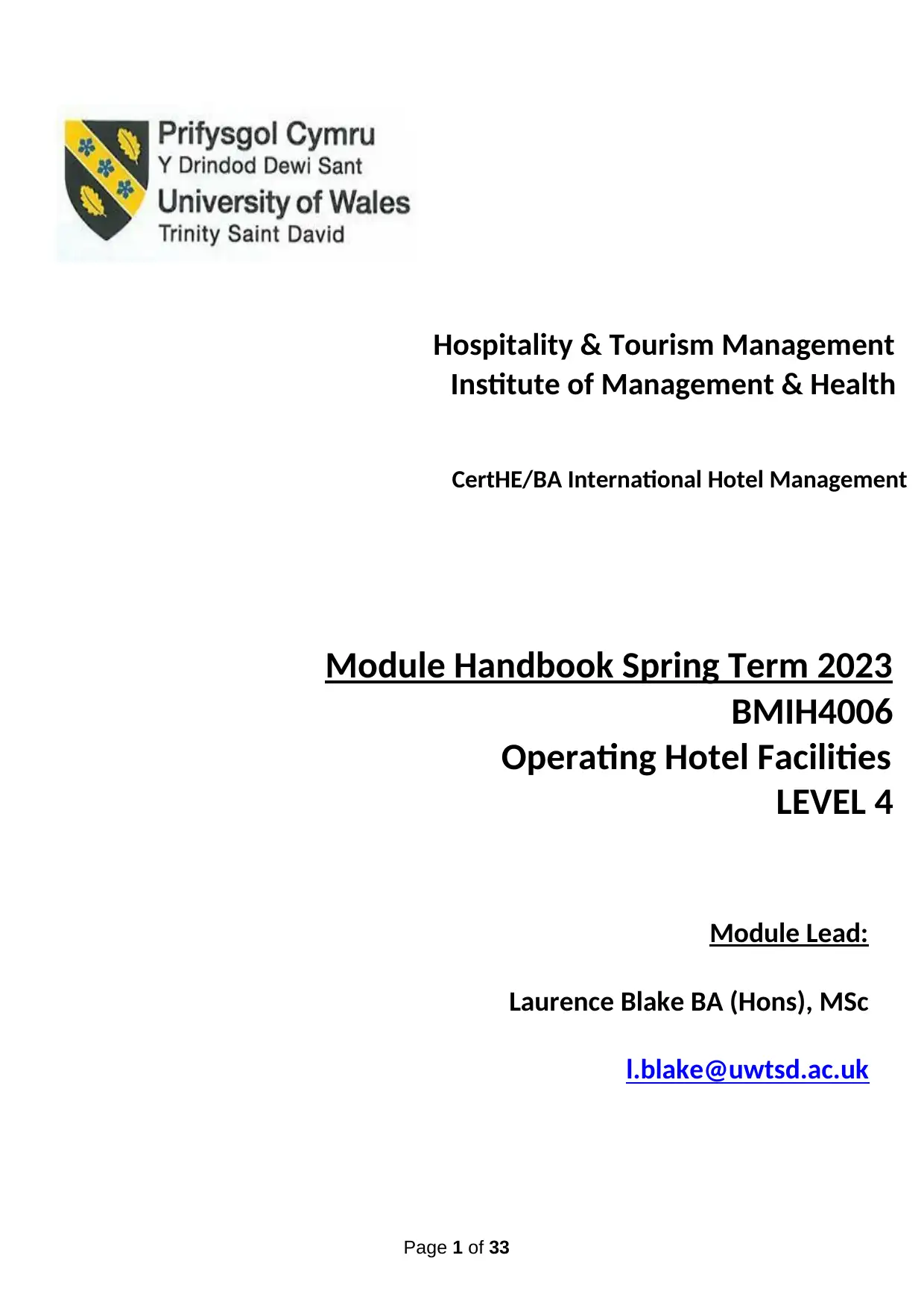
Page 1 of 33
Hospitality & Tourism Management
Institute of Management & Health
CertHE/BA International Hotel Management
Module Handbook Spring Term 2023
BMIH4006
Operating Hotel Facilities
LEVEL 4
Module Lead:
Laurence Blake BA (Hons), MSc
l.blake@uwtsd.ac.uk
Hospitality & Tourism Management
Institute of Management & Health
CertHE/BA International Hotel Management
Module Handbook Spring Term 2023
BMIH4006
Operating Hotel Facilities
LEVEL 4
Module Lead:
Laurence Blake BA (Hons), MSc
l.blake@uwtsd.ac.uk
Paraphrase This Document
Need a fresh take? Get an instant paraphrase of this document with our AI Paraphraser
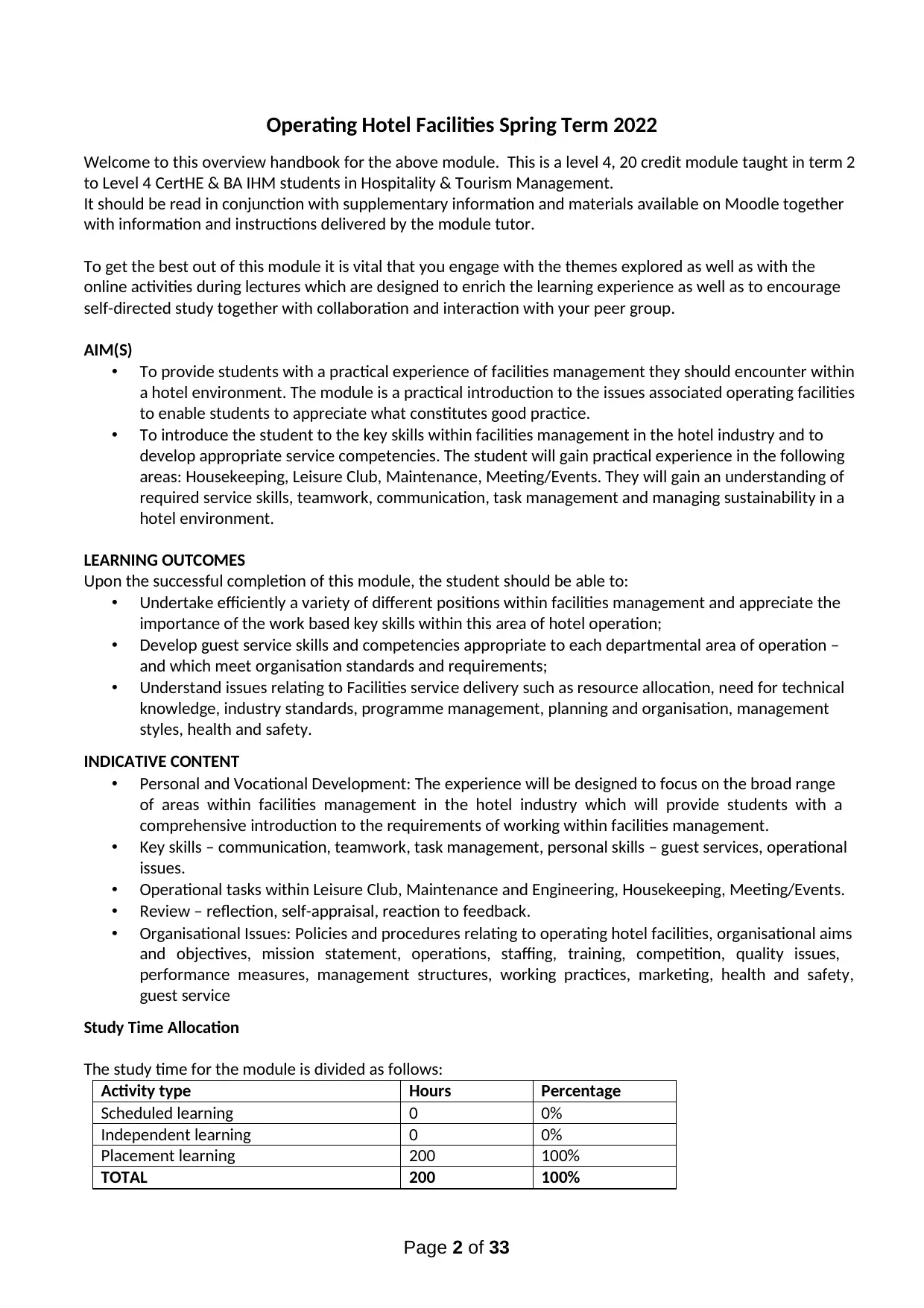
Page 2 of 33
Operating Hotel Facilities Spring Term 2022
Welcome to this overview handbook for the above module. This is a level 4, 20 credit module taught in term 2
to Level 4 CertHE & BA IHM students in Hospitality & Tourism Management.
It should be read in conjunction with supplementary information and materials available on Moodle together
with information and instructions delivered by the module tutor.
To get the best out of this module it is vital that you engage with the themes explored as well as with the
online activities during lectures which are designed to enrich the learning experience as well as to encourage
self-directed study together with collaboration and interaction with your peer group.
AIM(S)
• To provide students with a practical experience of facilities management they should encounter within
a hotel environment. The module is a practical introduction to the issues associated operating facilities
to enable students to appreciate what constitutes good practice.
• To introduce the student to the key skills within facilities management in the hotel industry and to
develop appropriate service competencies. The student will gain practical experience in the following
areas: Housekeeping, Leisure Club, Maintenance, Meeting/Events. They will gain an understanding of
required service skills, teamwork, communication, task management and managing sustainability in a
hotel environment.
LEARNING OUTCOMES
Upon the successful completion of this module, the student should be able to:
• Undertake efficiently a variety of different positions within facilities management and appreciate the
importance of the work based key skills within this area of hotel operation;
• Develop guest service skills and competencies appropriate to each departmental area of operation –
and which meet organisation standards and requirements;
• Understand issues relating to Facilities service delivery such as resource allocation, need for technical
knowledge, industry standards, programme management, planning and organisation, management
styles, health and safety.
INDICATIVE CONTENT
• Personal and Vocational Development: The experience will be designed to focus on the broad range
of areas within facilities management in the hotel industry which will provide students with a
comprehensive introduction to the requirements of working within facilities management.
• Key skills – communication, teamwork, task management, personal skills – guest services, operational
issues.
• Operational tasks within Leisure Club, Maintenance and Engineering, Housekeeping, Meeting/Events.
• Review – reflection, self-appraisal, reaction to feedback.
• Organisational Issues: Policies and procedures relating to operating hotel facilities, organisational aims
and objectives, mission statement, operations, staffing, training, competition, quality issues,
performance measures, management structures, working practices, marketing, health and safety,
guest service
Study Time Allocation
The study time for the module is divided as follows:
Activity type Hours Percentage
Scheduled learning 0 0%
Independent learning 0 0%
Placement learning 200 100%
TOTAL 200 100%
Operating Hotel Facilities Spring Term 2022
Welcome to this overview handbook for the above module. This is a level 4, 20 credit module taught in term 2
to Level 4 CertHE & BA IHM students in Hospitality & Tourism Management.
It should be read in conjunction with supplementary information and materials available on Moodle together
with information and instructions delivered by the module tutor.
To get the best out of this module it is vital that you engage with the themes explored as well as with the
online activities during lectures which are designed to enrich the learning experience as well as to encourage
self-directed study together with collaboration and interaction with your peer group.
AIM(S)
• To provide students with a practical experience of facilities management they should encounter within
a hotel environment. The module is a practical introduction to the issues associated operating facilities
to enable students to appreciate what constitutes good practice.
• To introduce the student to the key skills within facilities management in the hotel industry and to
develop appropriate service competencies. The student will gain practical experience in the following
areas: Housekeeping, Leisure Club, Maintenance, Meeting/Events. They will gain an understanding of
required service skills, teamwork, communication, task management and managing sustainability in a
hotel environment.
LEARNING OUTCOMES
Upon the successful completion of this module, the student should be able to:
• Undertake efficiently a variety of different positions within facilities management and appreciate the
importance of the work based key skills within this area of hotel operation;
• Develop guest service skills and competencies appropriate to each departmental area of operation –
and which meet organisation standards and requirements;
• Understand issues relating to Facilities service delivery such as resource allocation, need for technical
knowledge, industry standards, programme management, planning and organisation, management
styles, health and safety.
INDICATIVE CONTENT
• Personal and Vocational Development: The experience will be designed to focus on the broad range
of areas within facilities management in the hotel industry which will provide students with a
comprehensive introduction to the requirements of working within facilities management.
• Key skills – communication, teamwork, task management, personal skills – guest services, operational
issues.
• Operational tasks within Leisure Club, Maintenance and Engineering, Housekeeping, Meeting/Events.
• Review – reflection, self-appraisal, reaction to feedback.
• Organisational Issues: Policies and procedures relating to operating hotel facilities, organisational aims
and objectives, mission statement, operations, staffing, training, competition, quality issues,
performance measures, management structures, working practices, marketing, health and safety,
guest service
Study Time Allocation
The study time for the module is divided as follows:
Activity type Hours Percentage
Scheduled learning 0 0%
Independent learning 0 0%
Placement learning 200 100%
TOTAL 200 100%
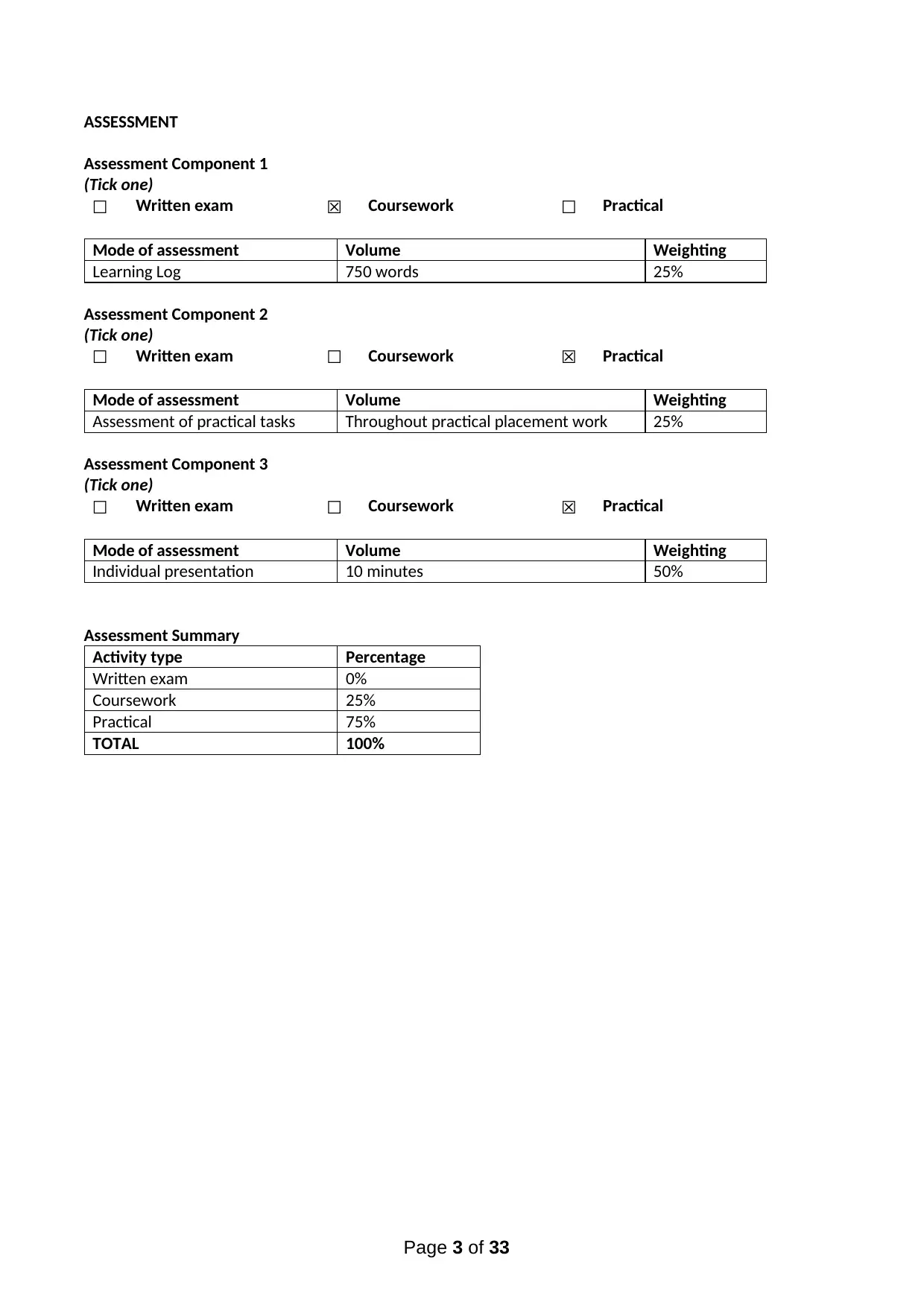
Page 3 of 33
ASSESSMENT
Assessment Component 1
(Tick one)
☐ Written exam ☒ Coursework ☐ Practical
Mode of assessment Volume Weighting
Learning Log 750 words 25%
Assessment Component 2
(Tick one)
☐ Written exam ☐ Coursework ☒ Practical
Mode of assessment Volume Weighting
Assessment of practical tasks Throughout practical placement work 25%
Assessment Component 3
(Tick one)
☐ Written exam ☐ Coursework ☒ Practical
Mode of assessment Volume Weighting
Individual presentation 10 minutes 50%
Assessment Summary
Activity type Percentage
Written exam 0%
Coursework 25%
Practical 75%
TOTAL 100%
ASSESSMENT
Assessment Component 1
(Tick one)
☐ Written exam ☒ Coursework ☐ Practical
Mode of assessment Volume Weighting
Learning Log 750 words 25%
Assessment Component 2
(Tick one)
☐ Written exam ☐ Coursework ☒ Practical
Mode of assessment Volume Weighting
Assessment of practical tasks Throughout practical placement work 25%
Assessment Component 3
(Tick one)
☐ Written exam ☐ Coursework ☒ Practical
Mode of assessment Volume Weighting
Individual presentation 10 minutes 50%
Assessment Summary
Activity type Percentage
Written exam 0%
Coursework 25%
Practical 75%
TOTAL 100%
⊘ This is a preview!⊘
Do you want full access?
Subscribe today to unlock all pages.

Trusted by 1+ million students worldwide
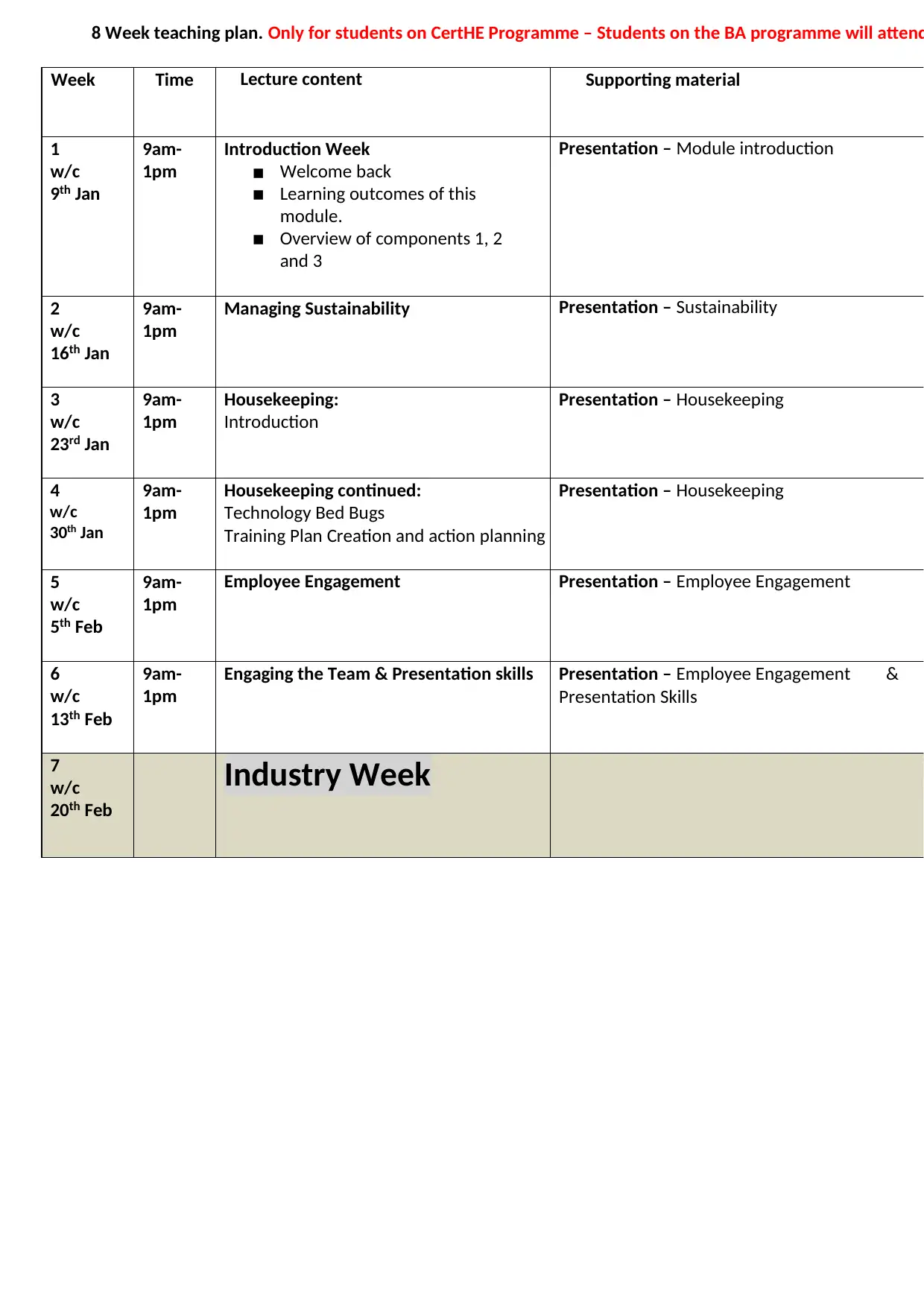
8 Week teaching plan. Only for students on CertHE Programme – Students on the BA programme will attend
Week Time Lecture content Supporting material
1
w/c
9th Jan
9am-
1pm
Introduction Week
▪ Welcome back
▪ Learning outcomes of this
module.
▪ Overview of components 1, 2
and 3
Presentation – Module introduction
2
w/c
16th Jan
9am-
1pm
Managing Sustainability Presentation – Sustainability
3
w/c
23rd Jan
9am-
1pm
Housekeeping:
Introduction
Presentation – Housekeeping
4
w/c
30th Jan
9am-
1pm
Housekeeping continued:
Technology Bed Bugs
Training Plan Creation and action planning
Presentation – Housekeeping
5
w/c
5th Feb
9am-
1pm
Employee Engagement Presentation – Employee Engagement
6
w/c
13th Feb
9am-
1pm
Engaging the Team & Presentation skills Presentation – Employee Engagement &
Presentation Skills
7
w/c
20th Feb
Industry Week
Week Time Lecture content Supporting material
1
w/c
9th Jan
9am-
1pm
Introduction Week
▪ Welcome back
▪ Learning outcomes of this
module.
▪ Overview of components 1, 2
and 3
Presentation – Module introduction
2
w/c
16th Jan
9am-
1pm
Managing Sustainability Presentation – Sustainability
3
w/c
23rd Jan
9am-
1pm
Housekeeping:
Introduction
Presentation – Housekeeping
4
w/c
30th Jan
9am-
1pm
Housekeeping continued:
Technology Bed Bugs
Training Plan Creation and action planning
Presentation – Housekeeping
5
w/c
5th Feb
9am-
1pm
Employee Engagement Presentation – Employee Engagement
6
w/c
13th Feb
9am-
1pm
Engaging the Team & Presentation skills Presentation – Employee Engagement &
Presentation Skills
7
w/c
20th Feb
Industry Week
Paraphrase This Document
Need a fresh take? Get an instant paraphrase of this document with our AI Paraphraser
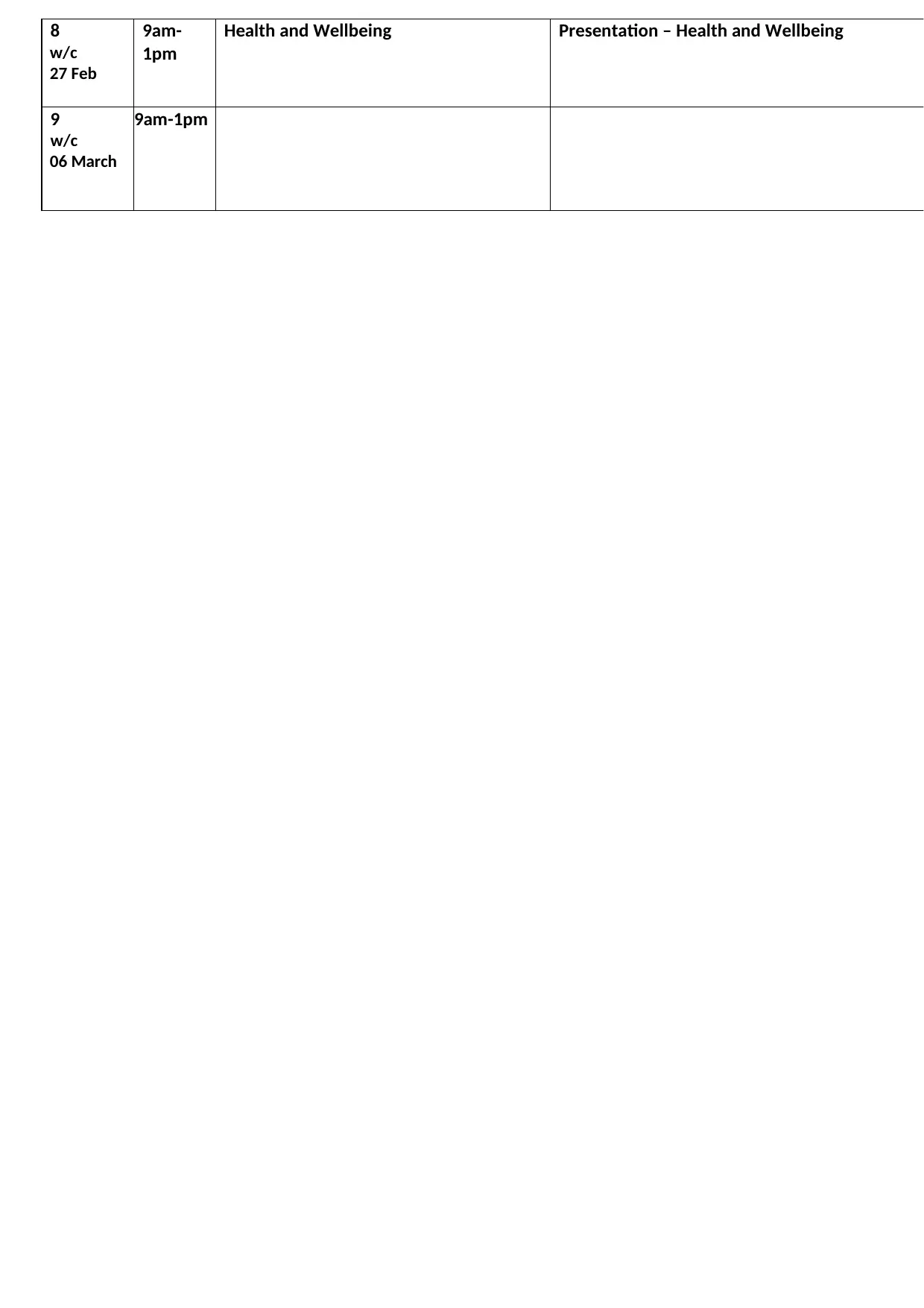
8
w/c
27 Feb
9am-
1pm
Health and Wellbeing Presentation – Health and Wellbeing
9
w/c
06 March
9am-1pm
w/c
27 Feb
9am-
1pm
Health and Wellbeing Presentation – Health and Wellbeing
9
w/c
06 March
9am-1pm
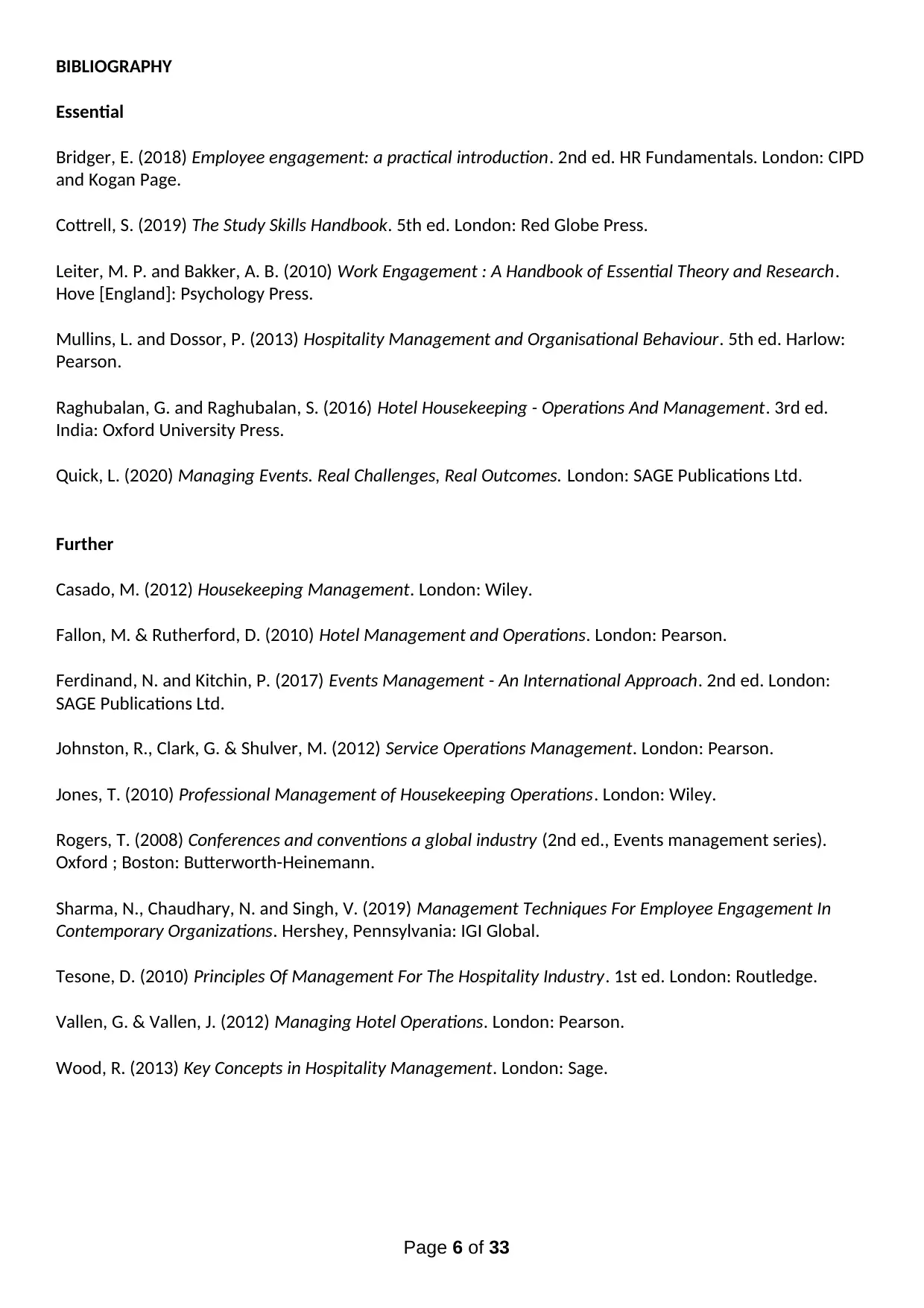
Page 6 of 33
BIBLIOGRAPHY
Essential
Bridger, E. (2018) Employee engagement: a practical introduction. 2nd ed. HR Fundamentals. London: CIPD
and Kogan Page.
Cottrell, S. (2019) The Study Skills Handbook. 5th ed. London: Red Globe Press.
Leiter, M. P. and Bakker, A. B. (2010) Work Engagement : A Handbook of Essential Theory and Research.
Hove [England]: Psychology Press.
Mullins, L. and Dossor, P. (2013) Hospitality Management and Organisational Behaviour. 5th ed. Harlow:
Pearson.
Raghubalan, G. and Raghubalan, S. (2016) Hotel Housekeeping - Operations And Management. 3rd ed.
India: Oxford University Press.
Quick, L. (2020) Managing Events. Real Challenges, Real Outcomes. London: SAGE Publications Ltd.
Further
Casado, M. (2012) Housekeeping Management. London: Wiley.
Fallon, M. & Rutherford, D. (2010) Hotel Management and Operations. London: Pearson.
Ferdinand, N. and Kitchin, P. (2017) Events Management - An International Approach. 2nd ed. London:
SAGE Publications Ltd.
Johnston, R., Clark, G. & Shulver, M. (2012) Service Operations Management. London: Pearson.
Jones, T. (2010) Professional Management of Housekeeping Operations. London: Wiley.
Rogers, T. (2008) Conferences and conventions a global industry (2nd ed., Events management series).
Oxford ; Boston: Butterworth-Heinemann.
Sharma, N., Chaudhary, N. and Singh, V. (2019) Management Techniques For Employee Engagement In
Contemporary Organizations. Hershey, Pennsylvania: IGI Global.
Tesone, D. (2010) Principles Of Management For The Hospitality Industry. 1st ed. London: Routledge.
Vallen, G. & Vallen, J. (2012) Managing Hotel Operations. London: Pearson.
Wood, R. (2013) Key Concepts in Hospitality Management. London: Sage.
BIBLIOGRAPHY
Essential
Bridger, E. (2018) Employee engagement: a practical introduction. 2nd ed. HR Fundamentals. London: CIPD
and Kogan Page.
Cottrell, S. (2019) The Study Skills Handbook. 5th ed. London: Red Globe Press.
Leiter, M. P. and Bakker, A. B. (2010) Work Engagement : A Handbook of Essential Theory and Research.
Hove [England]: Psychology Press.
Mullins, L. and Dossor, P. (2013) Hospitality Management and Organisational Behaviour. 5th ed. Harlow:
Pearson.
Raghubalan, G. and Raghubalan, S. (2016) Hotel Housekeeping - Operations And Management. 3rd ed.
India: Oxford University Press.
Quick, L. (2020) Managing Events. Real Challenges, Real Outcomes. London: SAGE Publications Ltd.
Further
Casado, M. (2012) Housekeeping Management. London: Wiley.
Fallon, M. & Rutherford, D. (2010) Hotel Management and Operations. London: Pearson.
Ferdinand, N. and Kitchin, P. (2017) Events Management - An International Approach. 2nd ed. London:
SAGE Publications Ltd.
Johnston, R., Clark, G. & Shulver, M. (2012) Service Operations Management. London: Pearson.
Jones, T. (2010) Professional Management of Housekeeping Operations. London: Wiley.
Rogers, T. (2008) Conferences and conventions a global industry (2nd ed., Events management series).
Oxford ; Boston: Butterworth-Heinemann.
Sharma, N., Chaudhary, N. and Singh, V. (2019) Management Techniques For Employee Engagement In
Contemporary Organizations. Hershey, Pennsylvania: IGI Global.
Tesone, D. (2010) Principles Of Management For The Hospitality Industry. 1st ed. London: Routledge.
Vallen, G. & Vallen, J. (2012) Managing Hotel Operations. London: Pearson.
Wood, R. (2013) Key Concepts in Hospitality Management. London: Sage.
⊘ This is a preview!⊘
Do you want full access?
Subscribe today to unlock all pages.

Trusted by 1+ million students worldwide
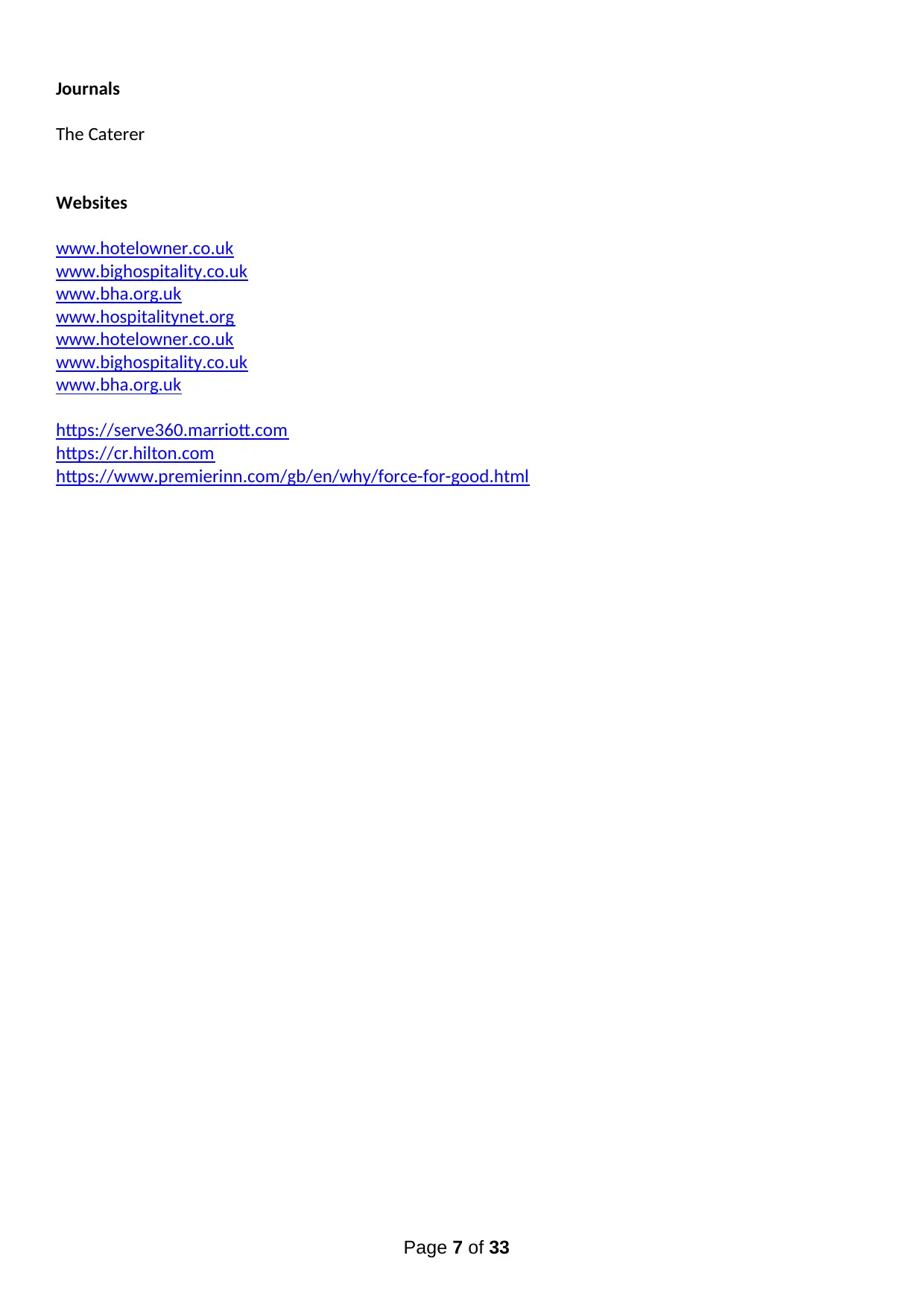
Page 7 of 33
Journals
The Caterer
Websites
www.hotelowner.co.uk
www.bighospitality.co.uk
www.bha.org.uk
www.hospitalitynet.org
www.hotelowner.co.uk
www.bighospitality.co.uk
www.bha.org.uk
https://serve360.marriott.com
https://cr.hilton.com
https://www.premierinn.com/gb/en/why/force-for-good.html
Journals
The Caterer
Websites
www.hotelowner.co.uk
www.bighospitality.co.uk
www.bha.org.uk
www.hospitalitynet.org
www.hotelowner.co.uk
www.bighospitality.co.uk
www.bha.org.uk
https://serve360.marriott.com
https://cr.hilton.com
https://www.premierinn.com/gb/en/why/force-for-good.html
Paraphrase This Document
Need a fresh take? Get an instant paraphrase of this document with our AI Paraphraser
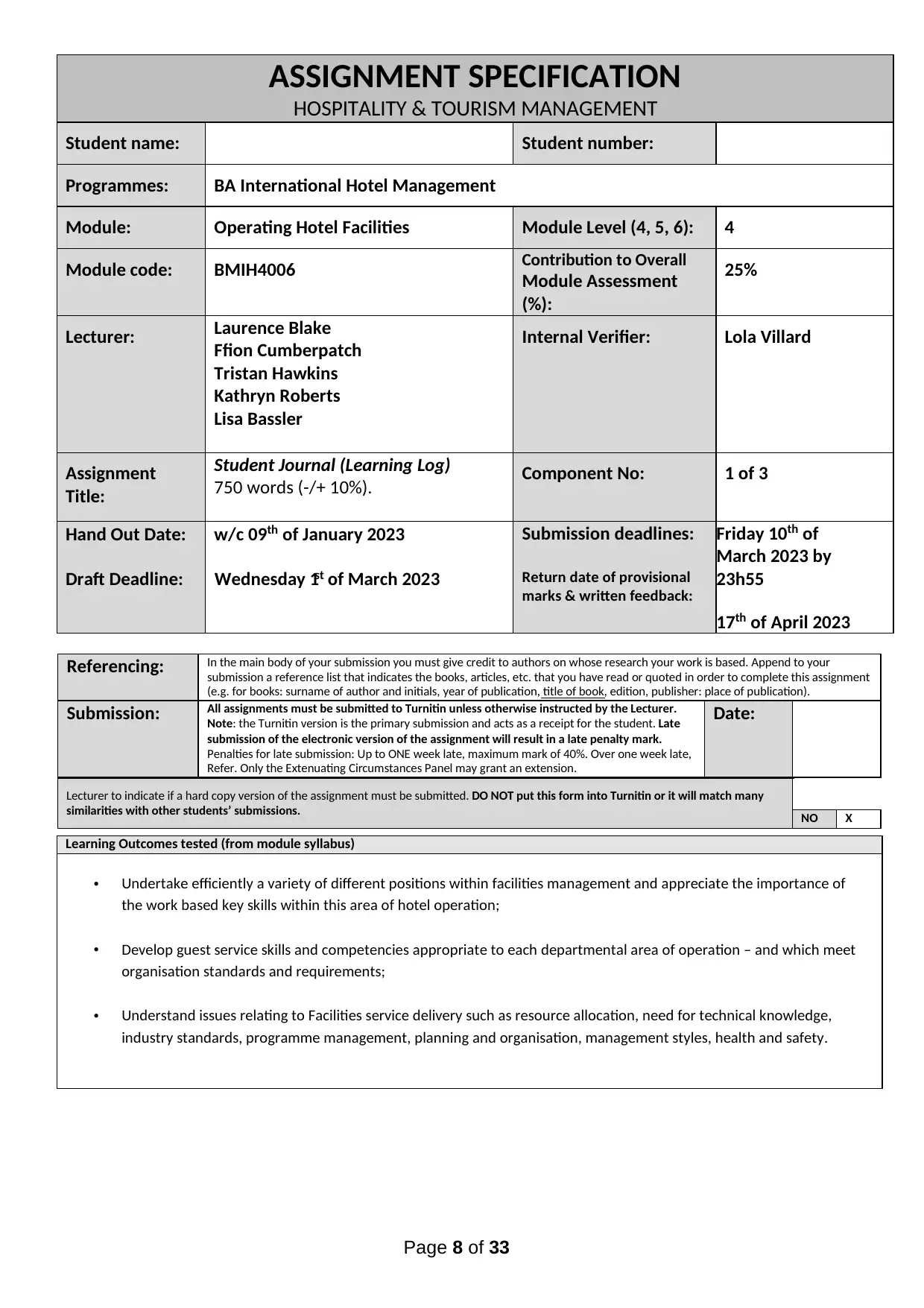
Page 8 of 33
ASSIGNMENT SPECIFICATION
HOSPITALITY & TOURISM MANAGEMENT
Student name: Student number:
Programmes: BA International Hotel Management
Module: Operating Hotel Facilities Module Level (4, 5, 6): 4
Module code: BMIH4006 Contribution to Overall
Module Assessment
(%):
25%
Lecturer: Laurence Blake
Ffion Cumberpatch
Tristan Hawkins
Kathryn Roberts
Lisa Bassler
Internal Verifier: Lola Villard
Assignment
Title:
Student Journal (Learning Log)
750 words (-/+ 10%). Component No: 1 of 3
Hand Out Date:
Draft Deadline:
w/c 09th of January 2023
Wednesday 1st of March 2023
Submission deadlines:
Return date of provisional
marks & written feedback:
Friday 10th of
March 2023 by
23h55
17th of April 2023
Referencing: In the main body of your submission you must give credit to authors on whose research your work is based. Append to your
submission a reference list that indicates the books, articles, etc. that you have read or quoted in order to complete this assignment
(e.g. for books: surname of author and initials, year of publication, title of book, edition, publisher: place of publication).
Submission: All assignments must be submitted to Turnitin unless otherwise instructed by the Lecturer.
Note: the Turnitin version is the primary submission and acts as a receipt for the student. Late
submission of the electronic version of the assignment will result in a late penalty mark.
Penalties for late submission: Up to ONE week late, maximum mark of 40%. Over one week late,
Refer. Only the Extenuating Circumstances Panel may grant an extension.
Date:
Lecturer to indicate if a hard copy version of the assignment must be submitted. DO NOT put this form into Turnitin or it will match many
similarities with other students’ submissions. NO X
Learning Outcomes tested (from module syllabus)
• Undertake efficiently a variety of different positions within facilities management and appreciate the importance of
the work based key skills within this area of hotel operation;
• Develop guest service skills and competencies appropriate to each departmental area of operation – and which meet
organisation standards and requirements;
• Understand issues relating to Facilities service delivery such as resource allocation, need for technical knowledge,
industry standards, programme management, planning and organisation, management styles, health and safety.
ASSIGNMENT SPECIFICATION
HOSPITALITY & TOURISM MANAGEMENT
Student name: Student number:
Programmes: BA International Hotel Management
Module: Operating Hotel Facilities Module Level (4, 5, 6): 4
Module code: BMIH4006 Contribution to Overall
Module Assessment
(%):
25%
Lecturer: Laurence Blake
Ffion Cumberpatch
Tristan Hawkins
Kathryn Roberts
Lisa Bassler
Internal Verifier: Lola Villard
Assignment
Title:
Student Journal (Learning Log)
750 words (-/+ 10%). Component No: 1 of 3
Hand Out Date:
Draft Deadline:
w/c 09th of January 2023
Wednesday 1st of March 2023
Submission deadlines:
Return date of provisional
marks & written feedback:
Friday 10th of
March 2023 by
23h55
17th of April 2023
Referencing: In the main body of your submission you must give credit to authors on whose research your work is based. Append to your
submission a reference list that indicates the books, articles, etc. that you have read or quoted in order to complete this assignment
(e.g. for books: surname of author and initials, year of publication, title of book, edition, publisher: place of publication).
Submission: All assignments must be submitted to Turnitin unless otherwise instructed by the Lecturer.
Note: the Turnitin version is the primary submission and acts as a receipt for the student. Late
submission of the electronic version of the assignment will result in a late penalty mark.
Penalties for late submission: Up to ONE week late, maximum mark of 40%. Over one week late,
Refer. Only the Extenuating Circumstances Panel may grant an extension.
Date:
Lecturer to indicate if a hard copy version of the assignment must be submitted. DO NOT put this form into Turnitin or it will match many
similarities with other students’ submissions. NO X
Learning Outcomes tested (from module syllabus)
• Undertake efficiently a variety of different positions within facilities management and appreciate the importance of
the work based key skills within this area of hotel operation;
• Develop guest service skills and competencies appropriate to each departmental area of operation – and which meet
organisation standards and requirements;
• Understand issues relating to Facilities service delivery such as resource allocation, need for technical knowledge,
industry standards, programme management, planning and organisation, management styles, health and safety.
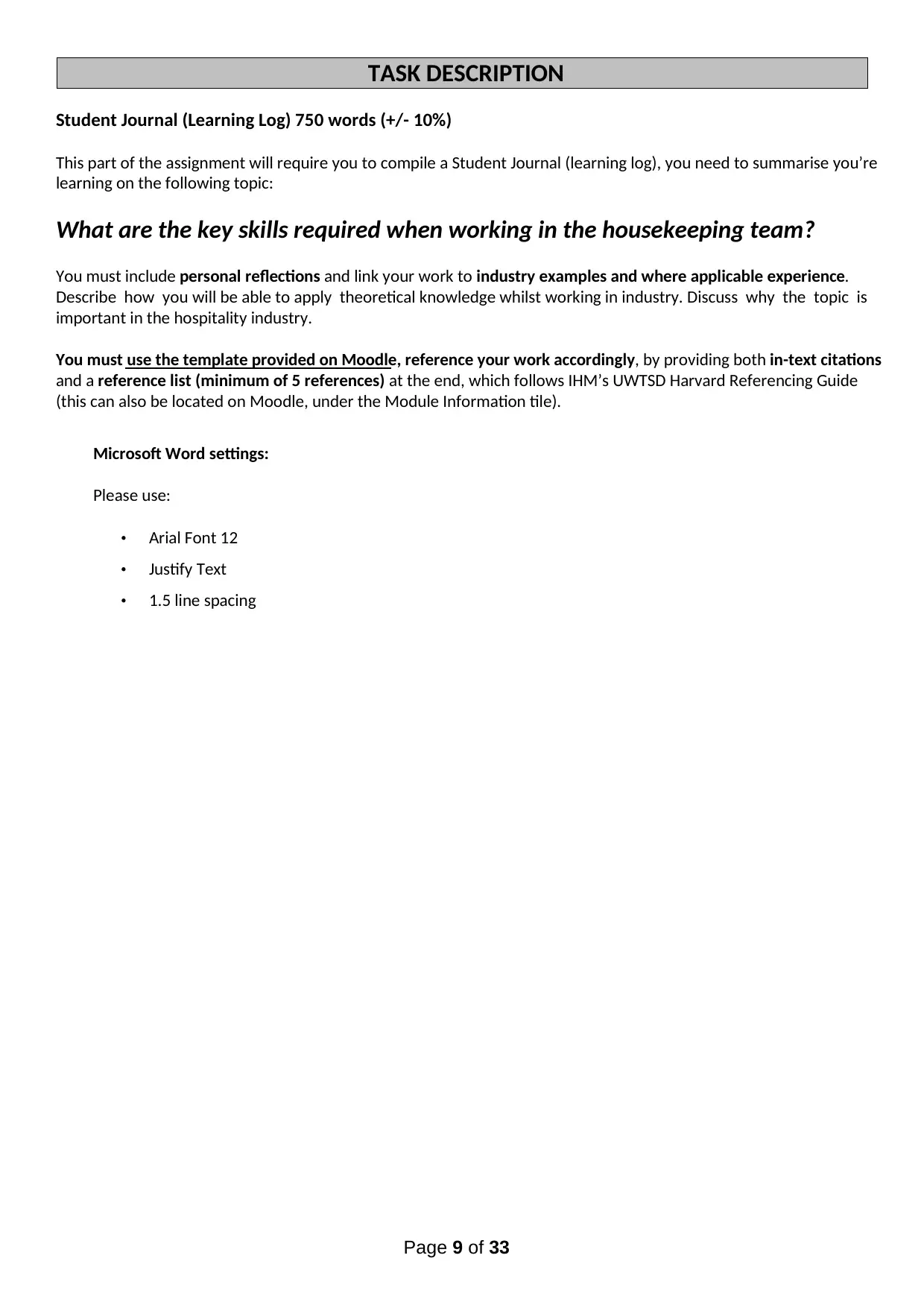
Page 9 of 33
Student Journal (Learning Log) 750 words (+/- 10%)
This part of the assignment will require you to compile a Student Journal (learning log), you need to summarise you’re
learning on the following topic:
What are the key skills required when working in the housekeeping team?
You must include personal reflections and link your work to industry examples and where applicable experience.
Describe how you will be able to apply theoretical knowledge whilst working in industry. Discuss why the topic is
important in the hospitality industry.
You must use the template provided on Moodle, reference your work accordingly, by providing both in-text citations
and a reference list (minimum of 5 references) at the end, which follows IHM’s UWTSD Harvard Referencing Guide
(this can also be located on Moodle, under the Module Information tile).
Microsoft Word settings:
Please use:
• Arial Font 12
• Justify Text
• 1.5 line spacing
TASK DESCRIPTION
Student Journal (Learning Log) 750 words (+/- 10%)
This part of the assignment will require you to compile a Student Journal (learning log), you need to summarise you’re
learning on the following topic:
What are the key skills required when working in the housekeeping team?
You must include personal reflections and link your work to industry examples and where applicable experience.
Describe how you will be able to apply theoretical knowledge whilst working in industry. Discuss why the topic is
important in the hospitality industry.
You must use the template provided on Moodle, reference your work accordingly, by providing both in-text citations
and a reference list (minimum of 5 references) at the end, which follows IHM’s UWTSD Harvard Referencing Guide
(this can also be located on Moodle, under the Module Information tile).
Microsoft Word settings:
Please use:
• Arial Font 12
• Justify Text
• 1.5 line spacing
TASK DESCRIPTION
⊘ This is a preview!⊘
Do you want full access?
Subscribe today to unlock all pages.

Trusted by 1+ million students worldwide
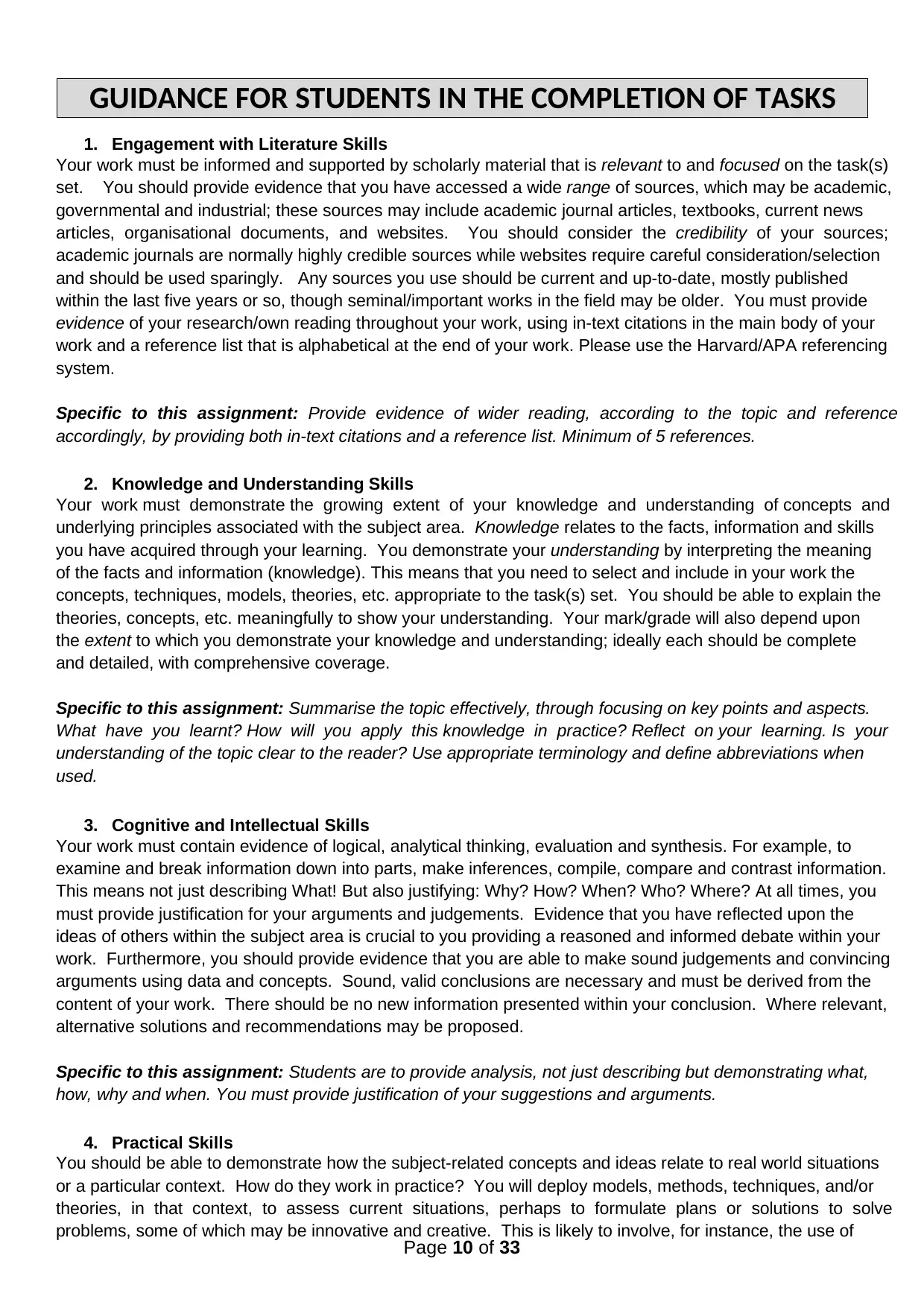
Page 10 of 33
1. Engagement with Literature Skills
Your work must be informed and supported by scholarly material that is relevant to and focused on the task(s)
set. You should provide evidence that you have accessed a wide range of sources, which may be academic,
governmental and industrial; these sources may include academic journal articles, textbooks, current news
articles, organisational documents, and websites. You should consider the credibility of your sources;
academic journals are normally highly credible sources while websites require careful consideration/selection
and should be used sparingly. Any sources you use should be current and up-to-date, mostly published
within the last five years or so, though seminal/important works in the field may be older. You must provide
evidence of your research/own reading throughout your work, using in-text citations in the main body of your
work and a reference list that is alphabetical at the end of your work. Please use the Harvard/APA referencing
system.
Specific to this assignment: Provide evidence of wider reading, according to the topic and reference
accordingly, by providing both in-text citations and a reference list. Minimum of 5 references.
2. Knowledge and Understanding Skills
Your work must demonstrate the growing extent of your knowledge and understanding of concepts and
underlying principles associated with the subject area. Knowledge relates to the facts, information and skills
you have acquired through your learning. You demonstrate your understanding by interpreting the meaning
of the facts and information (knowledge). This means that you need to select and include in your work the
concepts, techniques, models, theories, etc. appropriate to the task(s) set. You should be able to explain the
theories, concepts, etc. meaningfully to show your understanding. Your mark/grade will also depend upon
the extent to which you demonstrate your knowledge and understanding; ideally each should be complete
and detailed, with comprehensive coverage.
Specific to this assignment: Summarise the topic effectively, through focusing on key points and aspects.
What have you learnt? How will you apply this knowledge in practice? Reflect on your learning. Is your
understanding of the topic clear to the reader? Use appropriate terminology and define abbreviations when
used.
3. Cognitive and Intellectual Skills
Your work must contain evidence of logical, analytical thinking, evaluation and synthesis. For example, to
examine and break information down into parts, make inferences, compile, compare and contrast information.
This means not just describing What! But also justifying: Why? How? When? Who? Where? At all times, you
must provide justification for your arguments and judgements. Evidence that you have reflected upon the
ideas of others within the subject area is crucial to you providing a reasoned and informed debate within your
work. Furthermore, you should provide evidence that you are able to make sound judgements and convincing
arguments using data and concepts. Sound, valid conclusions are necessary and must be derived from the
content of your work. There should be no new information presented within your conclusion. Where relevant,
alternative solutions and recommendations may be proposed.
Specific to this assignment: Students are to provide analysis, not just describing but demonstrating what,
how, why and when. You must provide justification of your suggestions and arguments.
4. Practical Skills
You should be able to demonstrate how the subject-related concepts and ideas relate to real world situations
or a particular context. How do they work in practice? You will deploy models, methods, techniques, and/or
theories, in that context, to assess current situations, perhaps to formulate plans or solutions to solve
problems, some of which may be innovative and creative. This is likely to involve, for instance, the use of
GUIDANCE FOR STUDENTS IN THE COMPLETION OF TASKS
1. Engagement with Literature Skills
Your work must be informed and supported by scholarly material that is relevant to and focused on the task(s)
set. You should provide evidence that you have accessed a wide range of sources, which may be academic,
governmental and industrial; these sources may include academic journal articles, textbooks, current news
articles, organisational documents, and websites. You should consider the credibility of your sources;
academic journals are normally highly credible sources while websites require careful consideration/selection
and should be used sparingly. Any sources you use should be current and up-to-date, mostly published
within the last five years or so, though seminal/important works in the field may be older. You must provide
evidence of your research/own reading throughout your work, using in-text citations in the main body of your
work and a reference list that is alphabetical at the end of your work. Please use the Harvard/APA referencing
system.
Specific to this assignment: Provide evidence of wider reading, according to the topic and reference
accordingly, by providing both in-text citations and a reference list. Minimum of 5 references.
2. Knowledge and Understanding Skills
Your work must demonstrate the growing extent of your knowledge and understanding of concepts and
underlying principles associated with the subject area. Knowledge relates to the facts, information and skills
you have acquired through your learning. You demonstrate your understanding by interpreting the meaning
of the facts and information (knowledge). This means that you need to select and include in your work the
concepts, techniques, models, theories, etc. appropriate to the task(s) set. You should be able to explain the
theories, concepts, etc. meaningfully to show your understanding. Your mark/grade will also depend upon
the extent to which you demonstrate your knowledge and understanding; ideally each should be complete
and detailed, with comprehensive coverage.
Specific to this assignment: Summarise the topic effectively, through focusing on key points and aspects.
What have you learnt? How will you apply this knowledge in practice? Reflect on your learning. Is your
understanding of the topic clear to the reader? Use appropriate terminology and define abbreviations when
used.
3. Cognitive and Intellectual Skills
Your work must contain evidence of logical, analytical thinking, evaluation and synthesis. For example, to
examine and break information down into parts, make inferences, compile, compare and contrast information.
This means not just describing What! But also justifying: Why? How? When? Who? Where? At all times, you
must provide justification for your arguments and judgements. Evidence that you have reflected upon the
ideas of others within the subject area is crucial to you providing a reasoned and informed debate within your
work. Furthermore, you should provide evidence that you are able to make sound judgements and convincing
arguments using data and concepts. Sound, valid conclusions are necessary and must be derived from the
content of your work. There should be no new information presented within your conclusion. Where relevant,
alternative solutions and recommendations may be proposed.
Specific to this assignment: Students are to provide analysis, not just describing but demonstrating what,
how, why and when. You must provide justification of your suggestions and arguments.
4. Practical Skills
You should be able to demonstrate how the subject-related concepts and ideas relate to real world situations
or a particular context. How do they work in practice? You will deploy models, methods, techniques, and/or
theories, in that context, to assess current situations, perhaps to formulate plans or solutions to solve
problems, some of which may be innovative and creative. This is likely to involve, for instance, the use of
GUIDANCE FOR STUDENTS IN THE COMPLETION OF TASKS
Paraphrase This Document
Need a fresh take? Get an instant paraphrase of this document with our AI Paraphraser
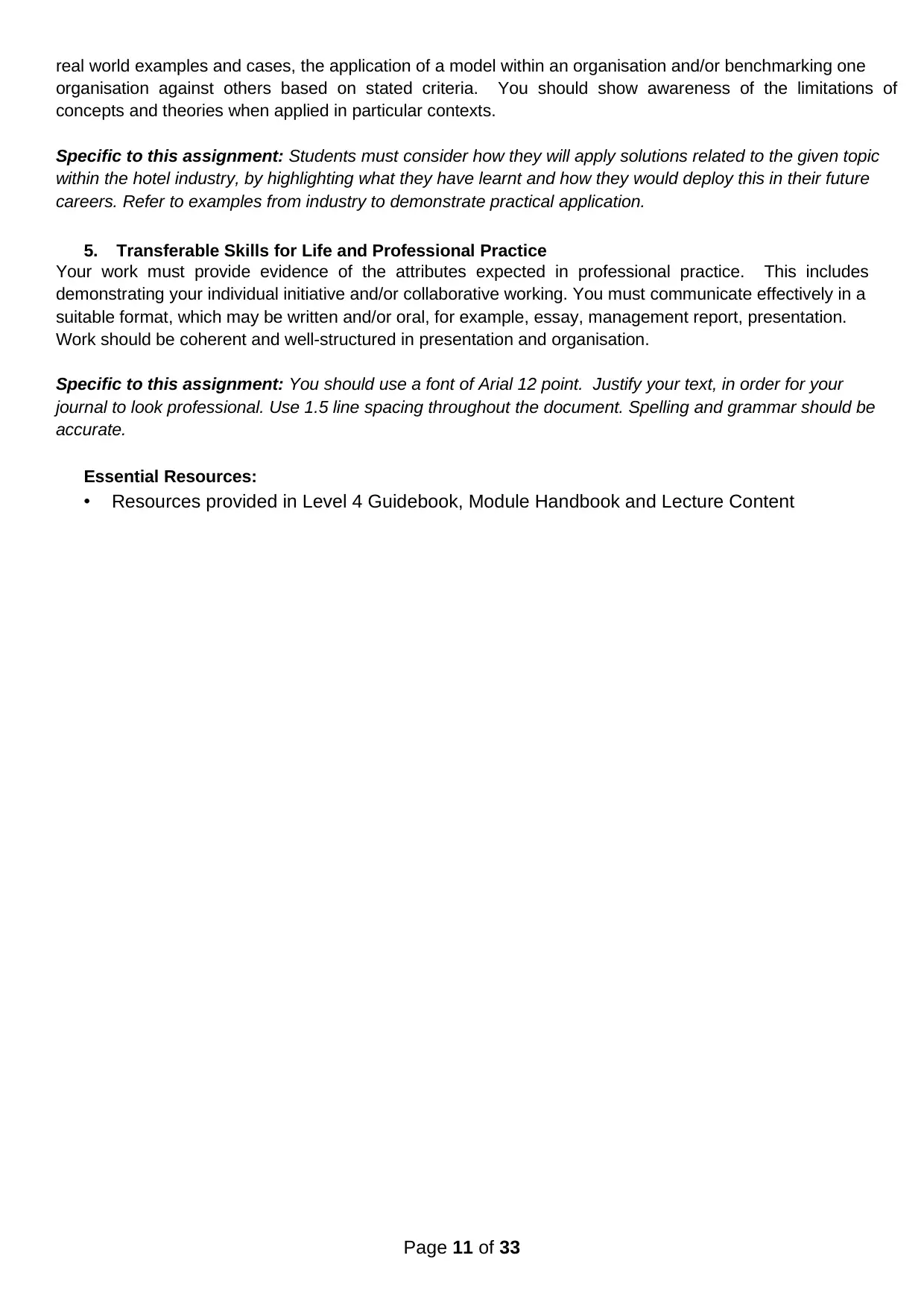
Page 11 of 33
real world examples and cases, the application of a model within an organisation and/or benchmarking one
organisation against others based on stated criteria. You should show awareness of the limitations of
concepts and theories when applied in particular contexts.
Specific to this assignment: Students must consider how they will apply solutions related to the given topic
within the hotel industry, by highlighting what they have learnt and how they would deploy this in their future
careers. Refer to examples from industry to demonstrate practical application.
5. Transferable Skills for Life and Professional Practice
Your work must provide evidence of the attributes expected in professional practice. This includes
demonstrating your individual initiative and/or collaborative working. You must communicate effectively in a
suitable format, which may be written and/or oral, for example, essay, management report, presentation.
Work should be coherent and well-structured in presentation and organisation.
Specific to this assignment: You should use a font of Arial 12 point. Justify your text, in order for your
journal to look professional. Use 1.5 line spacing throughout the document. Spelling and grammar should be
accurate.
Essential Resources:
• Resources provided in Level 4 Guidebook, Module Handbook and Lecture Content
real world examples and cases, the application of a model within an organisation and/or benchmarking one
organisation against others based on stated criteria. You should show awareness of the limitations of
concepts and theories when applied in particular contexts.
Specific to this assignment: Students must consider how they will apply solutions related to the given topic
within the hotel industry, by highlighting what they have learnt and how they would deploy this in their future
careers. Refer to examples from industry to demonstrate practical application.
5. Transferable Skills for Life and Professional Practice
Your work must provide evidence of the attributes expected in professional practice. This includes
demonstrating your individual initiative and/or collaborative working. You must communicate effectively in a
suitable format, which may be written and/or oral, for example, essay, management report, presentation.
Work should be coherent and well-structured in presentation and organisation.
Specific to this assignment: You should use a font of Arial 12 point. Justify your text, in order for your
journal to look professional. Use 1.5 line spacing throughout the document. Spelling and grammar should be
accurate.
Essential Resources:
• Resources provided in Level 4 Guidebook, Module Handbook and Lecture Content
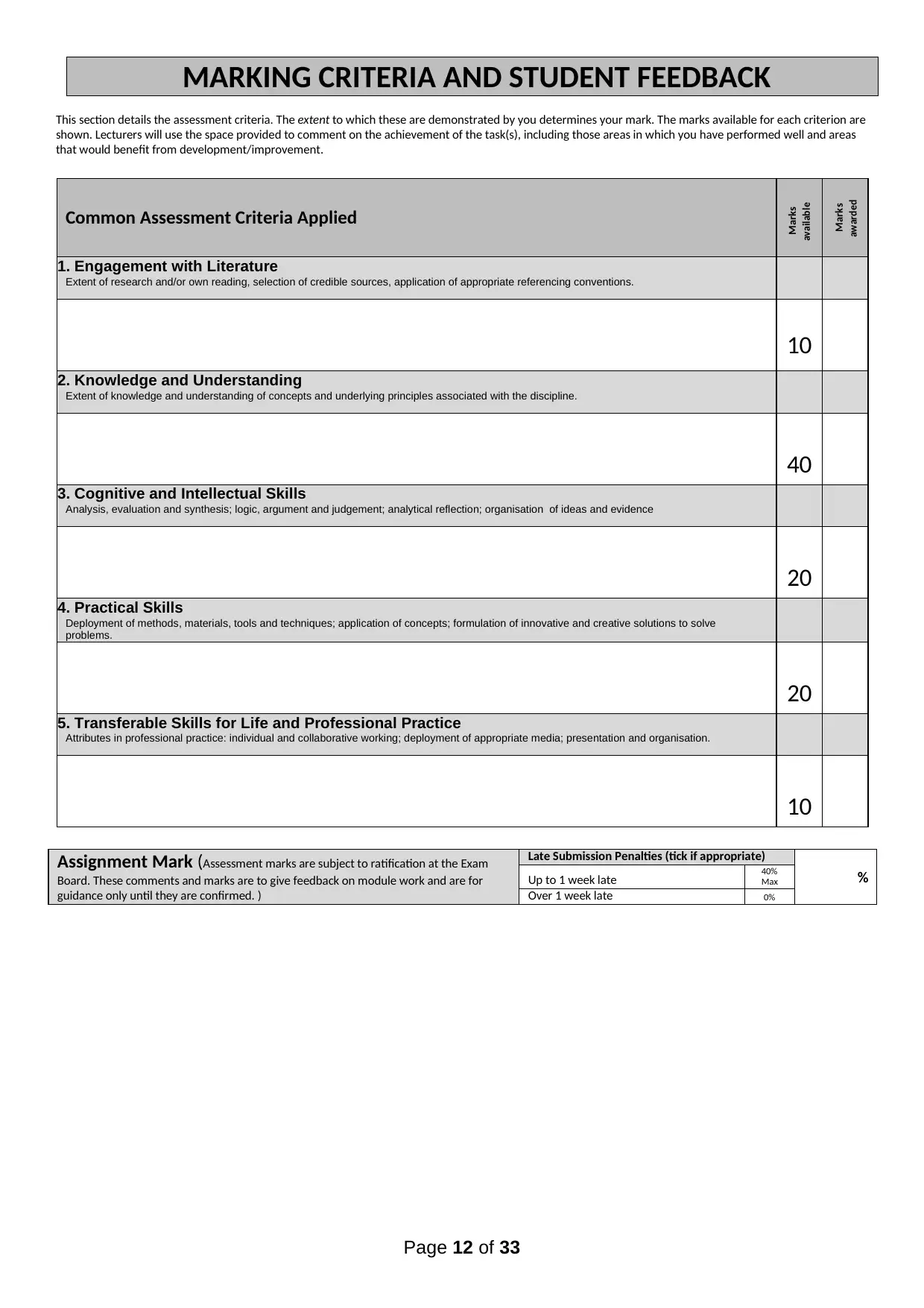
Page 12 of 33
This section details the assessment criteria. The extent to which these are demonstrated by you determines your mark. The marks available for each criterion are
shown. Lecturers will use the space provided to comment on the achievement of the task(s), including those areas in which you have performed well and areas
that would benefit from development/improvement.
Common Assessment Criteria Applied
Marks
available
Marks
awarded
1. Engagement with Literature
Extent of research and/or own reading, selection of credible sources, application of appropriate referencing conventions.
10
2. Knowledge and Understanding
Extent of knowledge and understanding of concepts and underlying principles associated with the discipline.
40
3. Cognitive and Intellectual Skills
Analysis, evaluation and synthesis; logic, argument and judgement; analytical reflection; organisation of ideas and evidence
20
4. Practical Skills
Deployment of methods, materials, tools and techniques; application of concepts; formulation of innovative and creative solutions to solve
problems.
20
5. Transferable Skills for Life and Professional Practice
Attributes in professional practice: individual and collaborative working; deployment of appropriate media; presentation and organisation.
10
Assignment Mark (Assessment marks are subject to ratification at the Exam
Board. These comments and marks are to give feedback on module work and are for
guidance only until they are confirmed. )
Late Submission Penalties (tick if appropriate)
%Up to 1 week late 40%
Max
Over 1 week late 0%
MARKING CRITERIA AND STUDENT FEEDBACK
This section details the assessment criteria. The extent to which these are demonstrated by you determines your mark. The marks available for each criterion are
shown. Lecturers will use the space provided to comment on the achievement of the task(s), including those areas in which you have performed well and areas
that would benefit from development/improvement.
Common Assessment Criteria Applied
Marks
available
Marks
awarded
1. Engagement with Literature
Extent of research and/or own reading, selection of credible sources, application of appropriate referencing conventions.
10
2. Knowledge and Understanding
Extent of knowledge and understanding of concepts and underlying principles associated with the discipline.
40
3. Cognitive and Intellectual Skills
Analysis, evaluation and synthesis; logic, argument and judgement; analytical reflection; organisation of ideas and evidence
20
4. Practical Skills
Deployment of methods, materials, tools and techniques; application of concepts; formulation of innovative and creative solutions to solve
problems.
20
5. Transferable Skills for Life and Professional Practice
Attributes in professional practice: individual and collaborative working; deployment of appropriate media; presentation and organisation.
10
Assignment Mark (Assessment marks are subject to ratification at the Exam
Board. These comments and marks are to give feedback on module work and are for
guidance only until they are confirmed. )
Late Submission Penalties (tick if appropriate)
%Up to 1 week late 40%
Max
Over 1 week late 0%
MARKING CRITERIA AND STUDENT FEEDBACK
⊘ This is a preview!⊘
Do you want full access?
Subscribe today to unlock all pages.

Trusted by 1+ million students worldwide
1 out of 35
Related Documents
Your All-in-One AI-Powered Toolkit for Academic Success.
+13062052269
info@desklib.com
Available 24*7 on WhatsApp / Email
![[object Object]](/_next/static/media/star-bottom.7253800d.svg)
Unlock your academic potential
Copyright © 2020–2026 A2Z Services. All Rights Reserved. Developed and managed by ZUCOL.





